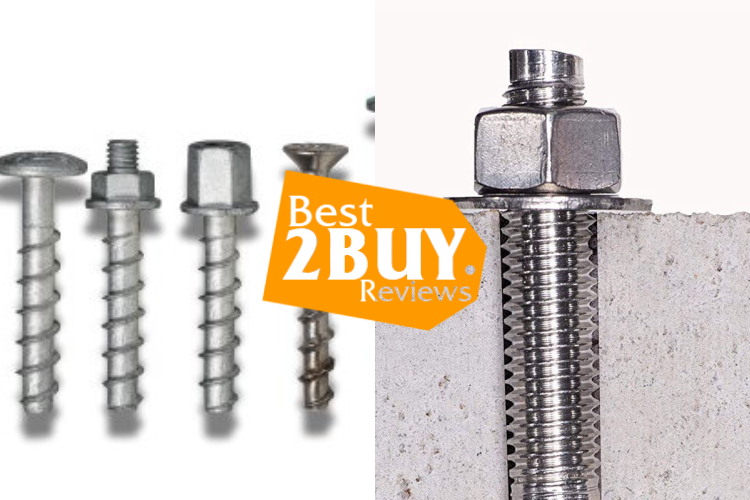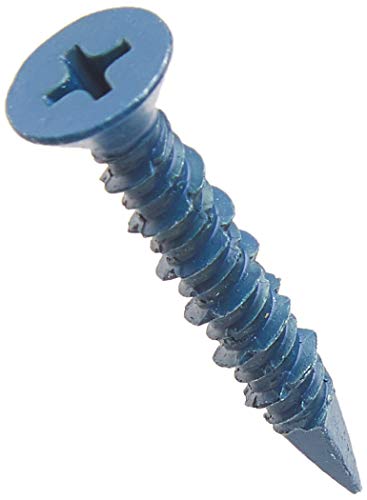How to Choose the Concrete Screws
Concrete Screws: A Comprehensive Guide

- 1. Concrete Screws: A Comprehensive Guide
- 1.1. What are concrete screws?
- 1.2. How do concrete screws work?
- 1.3. Types of concrete screw
- 1.3.1. Hex Head Concrete Screws
- 1.3.2. Tapcon Countersunk Head Screws
- 1.3.3. Concrete Frame Screw
- 2. Choosing the Right Concrete Screw
- 2.1. Substrate Selection
- 2.2. Screw Head Variation
- 2.3. Weight Load and Strength
- 2.4. Drilling Depth
- 2.5. Installation Frequency
- 2.6. Compliance with Specifications
- 3. How To Use Concrete Screws
Concrete screws have been in use for some time, providing a convenient and relatively straightforward method for installing HVAC and MEP services. Nevertheless, given the various options available, here are some valuable guidelines for effectively choosing and installing them.
What are concrete screws?
Concrete screws are typically employed to secure medium to high-load applications into concrete, solid brick, hollow brick, or stone surfaces. They may also be known as concrete anchors, concrete bolts, or concrete screw anchors.
Their primary purpose is to deliver a robust and dependable grip while allowing for swift and efficient installation, even in challenging substrates. Furthermore, they can be securely fastened near the concrete's edge without the concern of deformation.
Various styles of concrete screw anchors are accessible to cater to diverse application needs.
How do concrete screws work?
Concrete screws rely on a mechanical interlock for secure placement. When they are twisted into pre-drilled holes, their saw-toothed threads penetrate the concrete, establishing a mechanical connection between the screw and the underlying material. After installation, they can be fine-tuned if necessary, but this should be done in strict adherence to the guidelines provided in the ETA (European Technical Assessment).
Types of concrete screw
There are various types of concrete screws designed for specific purposes:
Hex Head Concrete Screws
These self-tapping screws with hexagonal heads come with washers and are intended for use in concrete, brick, dense blocks, and stone. Installation requires a wrench due to the hex head. The hexagonal head design allows for a secure and firm fastening, making them ideal for tasks like attaching rails and wall plates. These screws are suitable for use in:
Concrete with grades ranging from C20/25 to C50/60
- Non-cracked concrete
- Hollow concrete planks
- Solid brickwork
- Concrete blocks
- Natural stone
Tapcon Countersunk Head Screws
The Tapcon Countersunk Head Screw is part of a masonry fastening system that creates its own threads in concrete, masonry, and brick. It can also be employed in wood-to-concrete connections, making it versatile for various applications, including the installation of suspended ceilings, securing timber to concrete formwork battens, insulation systems for fire protection, and mechanical and electrical (M&E) applications. These screws offer several advantages, including the ability to be installed near edges, being removable and adjustable, providing fire resistance, and serving as a replacement for small-diameter expansion anchors, plugs, and screws in light to medium-duty applications. They are suitable for fixing into:
- Concrete
- Masonry
- Blockwork
- Pre-cast hollow concrete beams
- Wood
Concrete Frame Screw
The Concrete Frame Screw is a countersunk self-tapping anchor designed for use in concrete and masonry. It is particularly well-suited for securing window frames and doors, and its countersunk style results in a tidy finish. The undercutting action of these screws delivers a strong hold without the necessity of expansion, making them suitable for close-edge fixing. Installation involves drilling a 6mm hole, followed by screwing in with a T30 bit. They are suitable for fixing into:
- Dense concrete
- Bricks
- Natural stone
- Choosing the Right Concrete Screw
- How To Use Concrete Screws
Choosing the Right Concrete Screw
Prior to installation, contractors must initially choose the appropriate concrete screw for their specific application, taking into account project requirements and manufacturer recommendations:
Substrate Selection
Diverse substrates like concrete, cracked concrete, brick, or block necessitate different screw types. Ensure the selection of a screw explicitly tailored to the substrate type in use.
Screw Head Variation
Various concrete screw head designs cater to distinct applications and offer varying degrees of tightening. These include:
- Hex Head: Ideal for robust applications due to its ability to provide secure tightening and a strong through-fixing, commonly used for affixing rails and wall plates.
- Pan Head: Excellent for attaching channels directly to ceilings, facilitating the installation of pipes or ventilation ducts. It results in a flush attachment against the surface of the material.
- Rod Hanger: Offers a rapid alternative to conventional expansion anchors and is suitable for suspending threaded rods from ceiling installations.
- Stud Anchor: Featuring a male connection threaded screw, it is well-suited for securing pipe clamps, brackets, and channels with maximum efficiency, simplifying overhead installations.
Weight Load and Strength
Consider the size and strength requirements of the concrete screw, ensuring it is appropriately rated for the weight of the item to be supported.
Drilling Depth
Take into account the depth of the pilot hole to be drilled and the thickness of the substrate. Some concrete screws may necessitate deeper holes, potentially affecting the substrate's integrity.
Installation Frequency
Evaluate the quantity and size of items to be hung, determining how closely spaced the concrete screw fixings need to be in order to evenly distribute the weight of the items.
Compliance with Specifications
Confirm whether the project mandates specific approvals, such as the requirement for concrete screws or anchors to be ETA (European Technical Assessment) approved.
How To Use Concrete Screws
Prepare the essential tools and materials for concrete screw installation before you begin:
- Concrete screws suitable in size and type.
- A drill (opt for a hammer drill when working with tougher materials).
- A masonry drill bit (ensure it's carbide-tipped and matches the screw diameter).
- A screwdriver or wrench, depending on the screw head style.
- Protective gear, including a dust mask and safety glasses.
- A vacuum or brush for cleaning the drilled holes.
- A level and measuring tape.
Step-by-step Instructions For Using Concrete Screws:
- Surface Preparation
Start by ensuring that the concrete or masonry surface is thoroughly clean, free from debris, dust, or dirt. You can employ a wire brush or a vacuum cleaner, if necessary, to eliminate any loose particles. - Mark the Drilling Locations
Accurately mark the spots where you intend to install the concrete screws. Use a measuring tape and a level to make precise markings on the concrete surface with a pencil. - Choose the Correct Drill Bit
Select a masonry drill bit that matches the diameter of the concrete screw you intend to use. Refer to the package of the concrete screws for the recommended drill bit size. - Create Pilot Holes
Don safety goggles and, if required, a dust mask. Insert the chosen masonry bit into your power drill. Proceed to drill pilot holes into the concrete or masonry at the marked locations. These pilot holes should have a slightly smaller diameter than the concrete screws you plan to use. Ensure that you drill to the recommended depth, which is usually slightly deeper than the length of the screw. - Clear the Holes
Use a vacuum to remove any dust and debris from the drilled holes, ensuring they are clean and ready for screw insertion. - Screw Installation
Place the concrete screw into the pilot hole, ensuring proper alignment. Utilize a manual screwdriver or the appropriate driver bit on your power drill to begin driving the screw into the hole. Apply steady pressure while rotating the screw clockwise until it is securely fastened into the concrete. Ensure that the screw is inserted straight and does not cross-thread.
Tips for Using Concrete Screws
To ensure the best results when using concrete screws, consider the following tips:
- Choose the right size: Select the appropriate size of concrete screw based on the weight and size of the object you are fastening. Using screws that are too small may compromise the strength and stability of the connection.
- Use a hammer drill: For optimal results, use a hammer drill with a masonry bit to create a pilot hole in the concrete. This will make it easier to drive the screw into the material.
- Avoid over-tightening: While concrete screws provide excellent holding power, it is important not to over-tighten them. Doing so may cause the screw to strip or damage the concrete. Tighten the screw until it is snug, but avoid excessive force.
In conclusion, concrete screws revolutionize the process of attaching items to concrete surfaces. Their simple installation, impressive weight-bearing capabilities, ability to be removed, and adaptability establish them as the ultimate answer for securely fastening objects to this demanding material. Whether you're a seasoned contractor or a passionate DIY enthusiast, concrete screws represent a dependable option that guarantees your projects are firmly secured and built for long-lasting durability.









